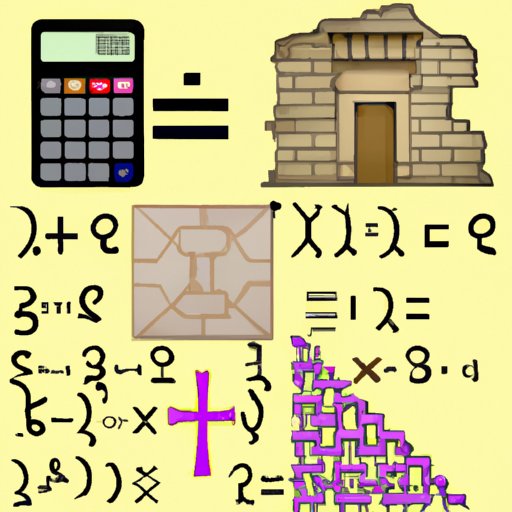Introduction
Algebra is a branch of mathematics that deals with symbols and the rules for manipulating those symbols. It is used to solve equations and represent relationships between unknown variables. Algebra is an important part of modern mathematics, but where did it come from? This article explores the history of algebra, from its beginnings in ancient times to its modern-day applications. We will trace the development of algebraic thought through the centuries and uncover the mysteries of its invention.
A Historical Overview of Algebra, from Ancient Times to the Present Day
Algebra has a long and varied history, with its roots stretching back thousands of years. Early forms of algebra can be found in ancient Egypt, Babylon and India, where mathematicians used geometric methods to solve equations. The Greeks were also influential in the development of algebraic thought, with contributions from famous thinkers such as Euclid, Pythagoras and Archimedes. During the Renaissance period, algebra was further advanced by Italian mathematicians such as Fibonacci and Tartaglia. In the 19th century, algebra was refined and extended by mathematicians such as Cauchy and Galois. In the 20th century, algebra was applied to new areas such as abstract algebra and linear algebra. Today, algebra is used in many fields, including engineering, physics, computer science and economics.
The Development of Algebra: An Exploration Through Time
To better understand the history of algebra, it is useful to examine how it came to be. The earliest known use of algebraic techniques can be traced back to ancient Egypt, Babylon and India. In these civilizations, mathematicians used geometric methods to solve equations. For example, the Rhind Papyrus, an ancient Egyptian text dating back to 1650 BC, contains problems involving linear equations. Similarly, the Babylonians used geometric methods to solve quadratic equations, as evidenced by clay tablets discovered in the mid-19th century. The Indian mathematician Brahmagupta also made significant contributions to early algebraic thought, developing the concept of zero and solving quadratic equations.
The Greeks were also influential in the development of algebra. Famous figures such as Euclid, Pythagoras and Archimedes made important contributions to the field. Euclid wrote the Elements, a treatise on geometry that laid the foundations for modern mathematics. Pythagoras developed the idea of irrational numbers and Archimedes used algebraic equations to calculate areas and volumes. These and other Greek thinkers laid the groundwork for later advances in algebra.
During the Renaissance period, algebra was further advanced by Italian mathematicians such as Fibonacci and Tartaglia. Fibonacci wrote the Liber Abaci, which introduced Hindu-Arabic numerals to Europe. Tartaglia solved cubic equations using what is now known as the “Tartaglia formula.” Other notable figures from this period include Cardano, who wrote the first book on algebra; Bombelli, who solved cubic and quartic equations; and Viète, who developed the theory of equations.
In the 19th century, algebra was refined and extended by mathematicians such as Cauchy and Galois. Cauchy developed the theory of limits, while Galois developed the theory of groups and fields. These and other 19th-century mathematicians helped to shape modern algebra. In the 20th century, algebra was applied to new areas such as abstract algebra and linear algebra. Today, algebra is used in many fields, including engineering, physics, computer science and economics.

Algebra: A Timeline of Discovery and Invention
Now that we have explored the historical development of algebra, we can turn our attention to the question of when it was invented. To answer this question, we must look at the timeline of discovery and invention. While the exact date of invention is unknown, we can trace the evolution of algebraic thought through the centuries.
The earliest known use of algebraic techniques dates back to ancient Egypt, Babylon and India. In these civilizations, mathematicians used geometric methods to solve equations. The Greeks were also influential in the development of algebraic thought, with contributions from famous thinkers such as Euclid, Pythagoras and Archimedes. During the Renaissance period, algebra was further advanced by Italian mathematicians such as Fibonacci and Tartaglia. In the 19th century, algebra was refined and extended by mathematicians such as Cauchy and Galois.
The invention of algebra is attributed to several different people throughout history. According to some sources, the ancient Babylonian mathematician Hammurabi is credited with inventing the first system of algebraic equations. Other sources attribute the invention of algebra to the ancient Greek mathematician Diophantus, who wrote the Arithmetica, a treatise on solving algebraic equations. Still others point to the 13th century Persian mathematician Muhammad ibn Mūsā al-Khwārizmī, who wrote the Al-jabr wa’l-muqābala, a book on algebraic equations.
Conclusion
In conclusion, algebra is an important branch of mathematics that has evolved over time. Its roots stretch back thousands of years, with early forms of algebra found in ancient Egypt, Babylon and India. The Greeks were also influential in the development of algebraic thought, with contributions from famous thinkers such as Euclid, Pythagoras and Archimedes. During the Renaissance period, algebra was further advanced by Italian mathematicians such as Fibonacci and Tartaglia. In the 19th century, algebra was refined and extended by mathematicians such as Cauchy and Galois. The exact date of invention is unknown, but the history of algebra can be traced back to ancient times.
This exploration of the history of algebra has given us insight into its development and invention. We have uncovered the mysteries of its origin and traced its evolution through the centuries. Algebra is an essential part of modern mathematics and its applications are wide-reaching. As we continue to explore the world of algebra, we may yet discover more about its fascinating history.
(Note: Is this article not meeting your expectations? Do you have knowledge or insights to share? Unlock new opportunities and expand your reach by joining our authors team. Click Registration to join us and share your expertise with our readers.)
